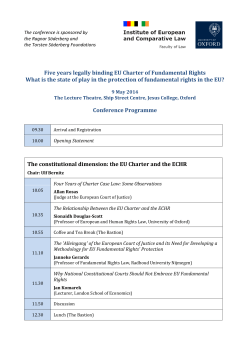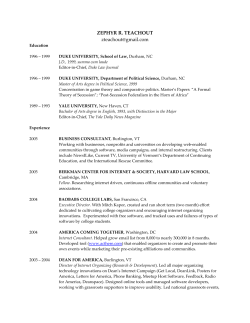
Women and the UN Secretariat
Law School Research Briefing no. 16 Dr Aoife O’Donoghue (Durham Law School) Dr Rosa Freedman (University of Birmingham) Women and the UN Secretariat The UN Charter clearly envisages a role for women Yet, the UN Secretariat (the international body of within the UN organisation. The Preamble and Articles staff of the UN) is not representative of ‘the peoples’. 1(3) and 8 directly address the role of women. The statistical breakdown shows that women remain Additionally, the geographic requirements contained in overrepresented at the two lowest levels within the Article 101 can further be interpreted as requiring Secretariat and underrepresented at the two main gender parity. While geographic representation is decision-making levels. usually interpreted to mean equitable representation of states, the phrase ‘We the peoples of the United Nations’ can also be interpreted to include all of the world’s population - including women. The UN has near-universal membership of states, combined with an almost-complete subject matter coverage. As a result it has near-universal jurisdiction and is the most influential global organisation in terms of law and policy across the broadest spectrum of areas. As such it is incumbent upon it to provide leadership in the area of gender equality. 30.2% at D1 and 25.7% at D2 60.2% at P1 and 57.3% at P2 Key Dates 1945 Women delegates attend San Francisco Conference - none with full delegate status 1986 General Assembly Resolution recognises gender as an issue for the Secretariat United Nations News Centre 1998 Creation of Focal Point for Women “ Although the few women appointed to high-ranking positions (either as external candidates or through internal promotions) should be celebrated, their appointments do not represent transformational moments within the UN. 2000 Goal aiming for gender parity by the millennium is missed 2000 UN Security Council Resolution 1325 - Women, Peace and Security 2010 Creation of UN Women Dr Rosa Freedman and Dr Aoife O’Donoghue Law School Research Briefing no. 16 www.durham.ac.uk/law ‘The UN is mandated to promote gender equality and nondiscrimination. Yet, the reality is that the UN remains dominated by one sex and any changes are at best cosmetic’ Dr Rosa Freedman & Dr Aoife O’Donoghue Case Study The Department of Peacekeeping Operations While the number of P2 (the lowest level) female staff has reduced by 19.5% to 53.8% the number of P3 staff that are women increased by 12.4% to 46.2%, thus nearly achieving the stated goal of gender parity at all levels. However, at the higher P4 and P5 levels there were small changes – one increase and one decrease – leaving both percentages in the 20s and far from gender parity. At the more senior levels there was a 16.1% decrease in female staff at D1. Other senior levels had no changes, other than at UnderSecretary General level which saw a 50% increase. While this last statistic sounds positive, in reality it means that over a decade one female had been appointed to head the department. According to these statistics, gender parity will not be reached for P4, D1, D2 and Assistant Secretary General levels for a considerable period and it will take until 2176 to achieve gender parity at P5 level. What does the Charter say? The UN Charter clearly envisages a role for women within the Organisation. Global Comparisons: What are other organisations doing? World Bank Group The Preamble President: Jim Yong Kim ‘reaffirm faith in fundamental human rights, in the dignity and worth of the human person, in the equal rights of men and women...to establish conditions under which justice and respect for the obligations...can be maintained’ Senior Roles: 37% women Article 1 (3) (Article 36(8) of the Rome Statute requires fair representation of men and women) ‘...promoting and encouraging respect for human rights and for fundamental freedoms for all without distinction as to race, sex, language, or religion’ International Criminal Court Chief Prosecutor: Fatou Bensouda Judiciary: 58% women Article 8 ‘The United Nations shall place no restrictions on the eligibility of men and women to participate in any capacity and under conditions of equality in its principal and subsidiary organs’ International Monetary Fund Managing Director: Christine Lagarde Three Deputies: Male Other Senior Roles : 15% women “ We the peoples of the United Nations...reaffirm faith in fundamental human rights, in the dignity and worth of the human person, in the equal rights of men and women… Preamble, UN Charter Dr Aoife O’Donoghue is a Senior Lecturer at Durham Law School. Dr O’Donoghue’s research focuses on public international law with a specific interest in global governance, constitutionalism and feminism. Aoife is Co-Director of the Northern/Irish Feminist Judgments Project. Dr Rosa Freedman is a Senior Lecturer at Birmingham Law School. Dr Freedman’s research focuses on the UN and human rights, in particular the impact of politics, international relations, the media, and civil society on the work and proceedings of United Nations human rights bodies. Law School Research Briefing no. 16 References R Freedman and A O’Donoghue, ‘Homo UNicus is a man: Being a Woman at the UN’ (Working Paper, forthcoming) This work has also been presented at Gender and Law at Durham (2014). www.durham.ac.uk/law
© Copyright 2025














